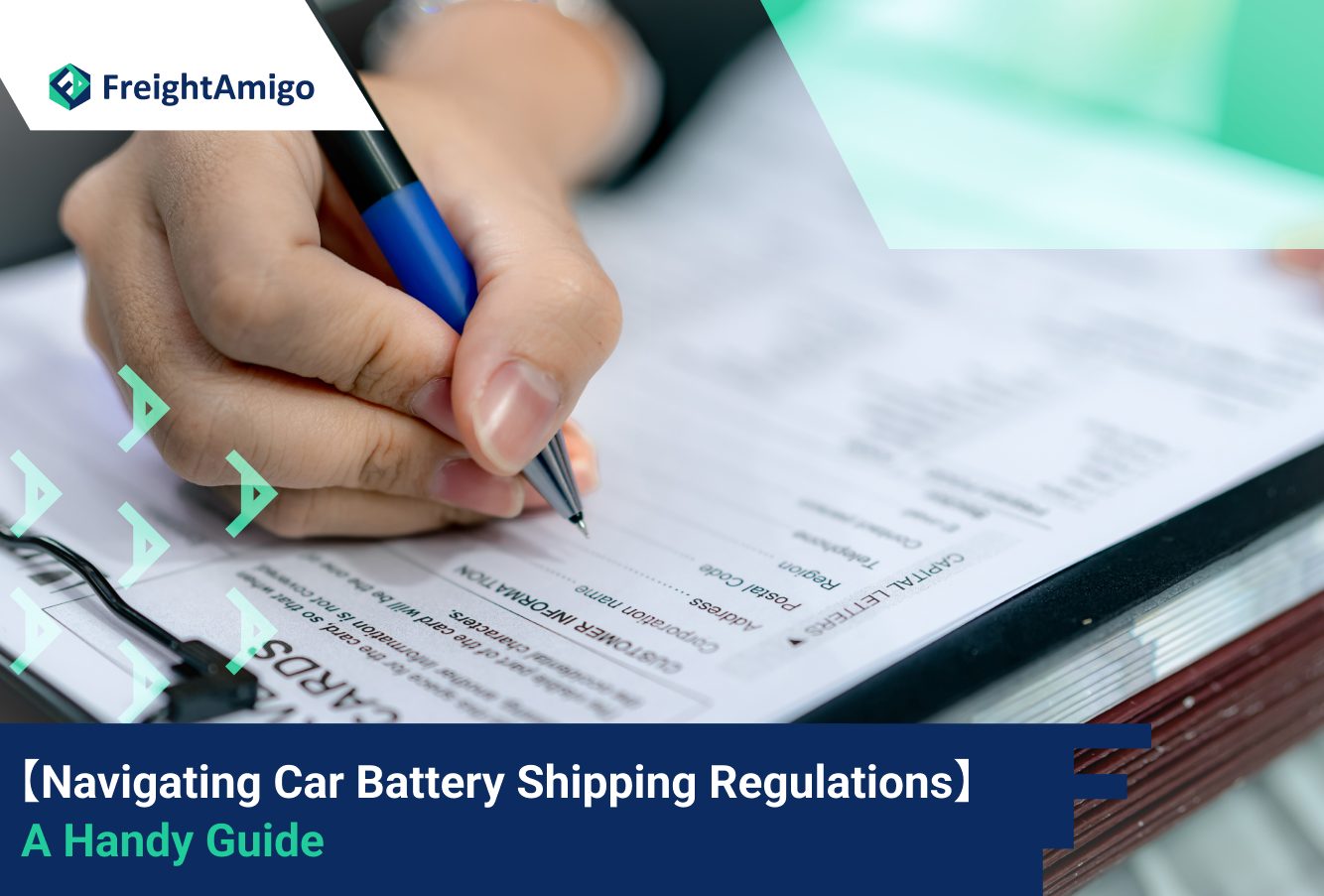When it comes to shipping car batteries, there are several regulations and requirements that need to be followed to ensure a smooth and compliant process. This handy guide will provide you with all the information you need to navigate car battery shipping regulations effectively.
Car batteries are considered hazardous materials due to their composition and potential for leakage or explosion. As a result, shipping them requires adherence to specific guidelines and documentation. These regulations are in place to protect the environment, ensure the safety of those handling the batteries, and prevent any potential accidents during transportation.
Author Name: Aiden Ng – Marketing Analyst at FreightAmigo
Want to compare the best Express, Air Freight, Sea Freight, Rail Freight & Trucking rates so as to have better control on cost?
Understanding the documentation required for car battery shipping
Before shipping car batteries, it is crucial to understand the documentation required to comply with regulations. The documentation may vary depending on the type of battery, its size, and the destination country. Here are some essential documents you need to have in order:
- Battery Safety Data Sheet (SDS): This document provides detailed information about the battery’s composition, potential hazards, and safety precautions. It is required to ensure that the battery meets the necessary safety standards for shipping.
- Transportation Permit: Depending on the country and mode of transportation, you may need a transportation permit to ship car batteries. This permit ensures that the batteries are being transported in compliance with the regulations and guidelines set by the relevant authorities.
- Customs Documentation: When shipping car batteries internationally, customs documentation, such as a commercial invoice and a bill of lading, will be required. These documents provide information about the batteries, their value, and the intended recipient.
International car battery shipping regulations
Shipping car batteries internationally involves additional regulations and considerations. It is essential to research and understand the specific regulations of the destination country to ensure compliance. Here are some key points to keep in mind when shipping car batteries internationally:
- Restricted or Prohibited Countries: Some countries have restrictions or prohibitions on the import of car batteries. Make sure to check the regulations of the destination country to ensure that you are allowed to ship car batteries there.
- Packaging and Labeling Requirements: International shipping regulations often require specific packaging and labeling for car batteries. This may include using durable packaging materials, securing the batteries to prevent movement, and affixing labels indicating the presence of hazardous materials.
- Transportation Modes: Different transportation modes, such as air, sea, or road, have their own set of regulations for shipping car batteries. Familiarize yourself with the specific requirements for each mode to ensure compliance.
Specific Regulations and Documentation Requirements in Some Popular Countries
Each country has its own specific regulations and documentation requirements for shipping car batteries. Here is a brief overview of the regulations in some popular countries:
- United States: The Department of Transportation (DOT) regulates the transportation of hazardous materials, including car batteries. Compliance with the DOT regulations is essential, including proper packaging, labeling, and documentation.
- United Kingdom: Car batteries are classified as dangerous goods in the UK and are subject to strict regulations. Compliance with the Carriage of Dangerous Goods and Use of Transportable Pressure Equipment (CDG) Regulations is mandatory.
- Australia: The Australian Dangerous Goods Code (ADG Code) governs the transportation of car batteries in Australia. Proper packaging, labeling, and documentation in accordance with the ADG Code are required.
- Canada: Transport Canada regulates the transportation of dangerous goods, including car batteries. Adherence to the Transportation of Dangerous Goods (TDG) Act is mandatory, including proper documentation and labeling.
Remember to research and familiarize yourself with the specific regulations of the country you are shipping to and ensure compliance to avoid any issues during shipping.
Tips for navigating the shipping regulations
Navigating car battery shipping regulations can be complex, but with the right knowledge and preparation, it can be a manageable process. Here are some tips to help you navigate the regulations effectively:
- Research and Stay Updated: Regulations and requirements for car battery shipping can change over time. Stay updated with the latest guidelines and regulations to ensure compliance. Regularly check the websites of relevant authorities and organizations for any updates.
- Proper Packaging and Labeling: Ensure that the car batteries are properly packaged and labeled according to the regulations. Use sturdy packaging materials that can withstand the rigors of transportation and affix appropriate labels to indicate the presence of hazardous materials.
- Work with Experienced Partners: Partnering with experienced carriers who have expertise in shipping hazardous materials, including car batteries, can make the process much smoother. They can guide you through the documentation requirements, packaging guidelines, and provide assistance in navigating the regulations.
Common challenges in complying with car battery shipping regulations
Complying with car battery shipping regulations can present some challenges. It is essential to be aware of these challenges and take the necessary steps to overcome them. Here are some common challenges you may face:
- Lack of Awareness: Many businesses and individuals shipping car batteries may not be aware of the specific regulations and requirements. Lack of awareness can result in non-compliance and potential penalties. Stay informed and educate yourself on the regulations to avoid any issues.
- Language Barriers: When shipping internationally, language barriers can pose challenges in understanding and complying with regulations. Use professional translation services or work with a shipping agent who can assist you in navigating the regulations in the destination country.
- Cost Considerations: Complying with car battery shipping regulations may involve additional costs, such as obtaining permits, packaging materials, and professional assistance. Factor in these costs when planning your shipping process to ensure compliance without impacting your budget significantly.
Conclusion: Ensuring compliance and smooth shipping processes
Navigating car battery shipping regulations may seem daunting, but with the right knowledge and preparation, it can be a smooth process. Understanding the documentation requirements, researching international regulations, and following the tips provided in this guide will help you ensure compliance and facilitate a hassle-free car battery shipping process.
Remember to stay updated with the latest regulations, work with experienced carriers, and properly package and label the batteries. Overcoming common challenges such as lack of awareness, language barriers, and cost considerations will contribute to a successful and compliant car battery shipping experience. By following these guidelines, you can navigate car battery shipping regulations with confidence and peace of mind.
There are different options for cargo transportation. If you want to choose the most convenient and suitable solution, it is best to have the full support of logistics experts! If you are planning to ship goods overseas, please go to the FreightAmigo page for inquiries.
Popular Shipping Routes:
Shipping from Hong Kong to Canada
Shipping from Hong Kong to the United States
===
If you have any inquiries on logistics/supply chain, feel free to contact FreightAmigo today:
Chat with us online OR
Hotline: +852 28121686
WhatsApp: +852 27467829








































